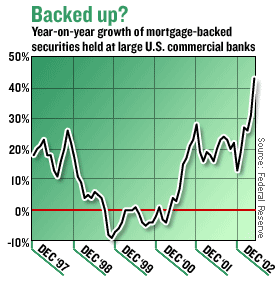NEW YORK (CNN/Money) -
Think the great American mortgage party has homeowners laughing all the way to the bank? You should see the gut the banks are busting.
All year long mortgage activity has looked fairly heady, but since the Fed last got together, on May 6, it's been in overdrive. In the week ahead of the meeting, according to Freddie Mac, the average rate on a 30-year mortgage was at 5.7 percent. Now it's at 5.21 percent.

In response, householders went to the mortgage till like never before: The Mortgage Bankers Association's indexes of new mortgage and refinancing activity both have recently logged new all-time highs. In the latest "beige book" -- the periodic survey of the economy by Federal Reserve banks -- one Chicago bank indicated that mortgage applications rose by 40 percent in the last three weeks of May.
Some observers have speculated that activity would be even more frenzied but for the fact that lenders simply can't process mortgage applications fast enough. Indeed, in the beige book, the Richmond Fed noted one Charleston, S.C., banker had "all the residential mortgage business he could handle" while a Greenville, S.C., banker said he was "swamped" with applications.
What's behind the move? In the statement it released following the May 6 meeting, the Fed indicated it was more worried about the potential for deflation than inflation. To the market, that read like a promise that while the fed funds rate, now at a 40-year low of 1.25 percent, may go lower, it will not be going higher any time soon.
“ The banks are the biggest sheep on the planet. Wherever the next problem is, it's where the banks are now. ”
Bill Fleckenstein
Fleckenstein Capital
|
And suddenly, like magic, mortgage debt began to look a lot less risky to financial institutions. No longer worried that short-term rates are going to go up, they began to borrow and buy up the tradable baskets of mortgages known as mortgage-backed securities with abandon. According to the Fed, large domestic banks added $35.8 billion in mortgage-backed securities to their portfolios in the four weeks ended May 28 and are now carrying 43 percent more of the securities on their books than they did a year ago.
It's an attractive trade, says CreditSights analyst Dave Hendler, because banks are paying 1.5 percent or less to their depositors and they're getting north of 5 percent on mortgages. And the banks that got in the game before the Fed waved its wand have benefited the most.
"The banks that were in early on this are making a lot of money," he said. "Some have been a little more conservative, and that has not helped their earnings at all, because the trade continues."
Come next month, when banks report second-quarter results, the effect of the mortgage trade will become clear. The big banks that are heaviest in mortgage backeds -- outfits like FleetBoston (FBF: Research, Estimates), U.S. Bancorp (USB: Research, Estimates) and PNC Bank (PNC: Research, Estimates) -- could see their bottom lines swell, leaving their more stolid peers pining for their profits.
"The more they do it, the more participants they're going to draw in," Hendler said.
Maybe not today...
But while the mortgage trade will be a boon for profits in the short term, in time it could put the banks in a tight spot. When rates do rise -- and someday they will -- mortgage rates tend to rise faster and more than other types of debt. In 1994, for example, when the Fed went into tightening mode after a long hiatus, the yield on the 10-year Treasury rose 1.34 percentage points to 7.17 percent. The average rate on a 30-year mortgage rose 2.03 percentage points to 9.2 percent. And institutions that had bet big on mortgage-backeds got creamed.
"The banks are the biggest sheep on the planet," said Bill Fleckenstein, head of Fleckenstein Capital. "Wherever the next problem is, it's where the banks are now. They lent to the oil patch in the early 1980s. They got long Wall Street at the end of the 1990s. And now they're loading up on mortgage-backeds. This is an accident waiting to happen."
What the banks hope, said Jim Bianco, president of Bianco Research, is that they'll somehow be able to stick their finger in the wind, realize that rates are going to head up, and unwind their outsized exposure to mortgage-backeds. Some may succeed, but it's unrealistic to think that they all will -- if everyone becomes a seller at the same time, after all, rates will go up right there and then. That'd be ugly.

|

